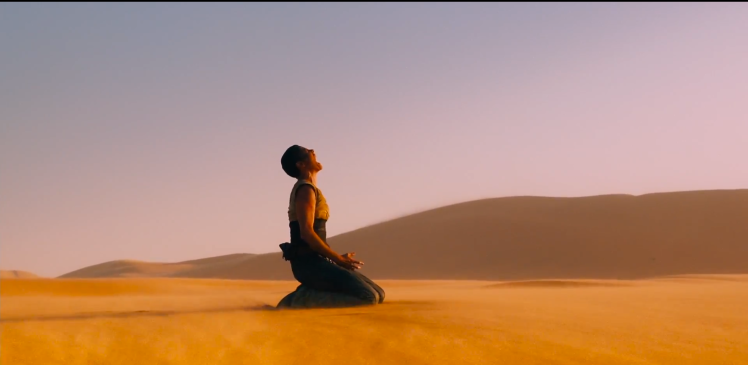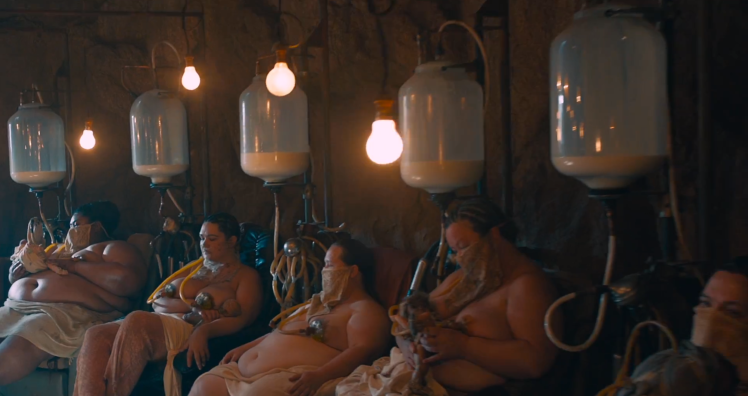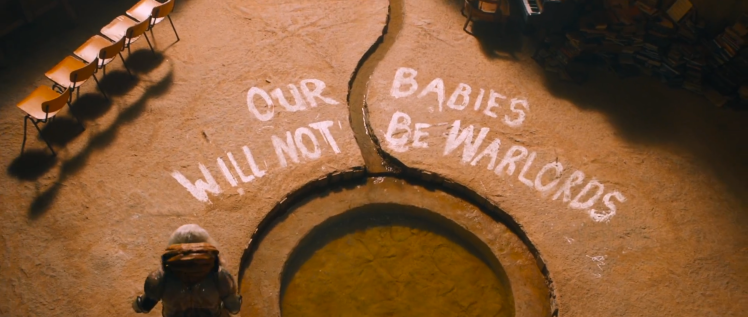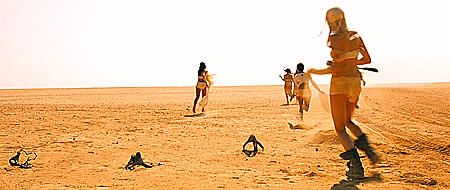Eileen Jones and Jessica Valenti stand opposite each other in their respective reviews of George Miller’s Mad Max: Fury Road. Unfortunately, only Valenti reviews the film objectively, whereas Jones incorporates her own bias unrelated to Fury Road to shape an unprofessionally written article.
I think there’s no question that Mad Max: Fury Road is, at the very least, feminist. If we look at the core definition of feminism and relate it to the history of women’s representation on film, Fury Road stands tall next the majority. But a film can be feminist outside the construct of its plot. The debate about whether or not Mad Max: Fury Road is a feminist film reminds me of a similar debate that occurred not even a year prior to its release. From The Observer, to The Guardian, to Time, many people debated whether or not Gone Girl was a feminist film in 2014. Rosamund Pike’s ‘Amazing Amy’ was stone cold, manipulative, and murderous. It that the representation women should get? Does her character succumb to stereotype and negative connotation? Even if it did, does that make it anti-feminist? Although she was a villain, Amy was a well-written, rounded character, with clear motives. To me, that’s leagues better than a female character being upstanding but one-dimensional. The most feminist thing a screenwriter can do is portray their female character as human: even if that means being messy and imperfect. Because that’s what humans are.
Fury Road doesn’t share the same issues with Gone Girl. The protagonist, (or co-protagonist if you see the film’s namesake as the main character) Imperator Furiosa (Charlize Theron), is portrayed generally positively. She not only is smart, but caring; for she devises a well executed plan to help free Immortan Joe’s sex slaves and escape his tyranny with them. She’s also well-rounded; a skilled fighter who has loyalty and devotion to Joe’s wives. We root for her because she’s doing the right thing, and then are deeply sympathetic when we discover that her plights have been fruitless.

In this scene, we learn about her personal connection to this journey: She’s been trying to return home. When the lookout recognizes her and asks, “How long has it been?” Furiosa’s confident, “7,000 days” expresses an commitment to remembering home, as well as constant longing to return to it. Her scream when she realizes that this home no longer exists punctuates this with such poignancy that a human connection to the audience is nearly guaranteed. This is truly the root of feminist film; not a female character that can shoot, has a lot of dialogue, or wins in a fight. It’s a woman any person can connect to.
But Fury Road does more than just equate women and men; it puts relations and sexism at its forefront. Valenti puts it well when she writes:
[The film is] not feminist because Theron’s character gets to engage in as much violence as any other action lead, but because the world director and writer George Miller has created shows the horror of sexism and the necessity of freedom from patriarchy.
As referenced earlier, the entire plot surrounds Furiosa helping free the sex slaves (dubbed “breeders” and “wives” in the film) from a possessive overlord. His objectification of these women is a constant theme throughout the film. In its production design:




To it’s dialogue:
“Return my treasures to me,” demands Joe to his followers, in reference of the women.
“They are not your property! You cannot own a human being! Sooner or later, someone pushes back!” Says Miss Giddy when Joe first finds his wives missing.
“You already damaged one of his wives,” Furiosa reminds Max after his bullet has grazed the leg of the Splendid Angharad (Rosie Huntington-Whiteley).
As pointed out by Nathanial Hood for The Young Folks, one incredibly telling scene is when the heavily pregnant Angharad’s uses her body as a shield for Furiosa before her death. He writes:
“[Joe] views them first and foremost as disposable wombs for his bastard children. When Joe recovers Angharad’s body after she falls from Furiosa’s War Rig, he immediately tells his doctor to cut the child out and ignore the well-being of the mother. It isn’t difficult to interpret this scene as a metaphor for the modern struggle for female reproductive rights wherein the rights of unborn children are placed above those of their mothers. Angharad’s survival, and by extension the survival of all of Joe’s slaves, is superfluous as long as they can produce babies every nine months. But in shielding Furiosa with her unborn child, Angharad uses the abuse of her reproductive capabilities as a means with which to fight back and defy her terrorizer.”
Miller paints an extreme picture of violent patriarchy as the backdrop for his otherwise plot-light action spectacle; empowering women in an traditionally male dominated genre.
Referencing Sharon Smith’s accounts, Sue Thornham writes that “films both reflect social structures and changes and misrepresents them according to the fantasies and fears of their male creators” (10). However, here we see a male writer/director reflecting society in a way that negatively depicts these male fantasies, portraying them as immoral and dictating. Despite the film’s bizarre world, Claire Johnston (author of Notes on Women’s Cinema) believes that “to evaluate cinematic images of women in terms of their great or lesser ‘truth’ or their degrees of ‘distortion’ is therefore … to miss the point” (Thornham 12).
In her article, Valenti cites many of these moments as being what makes the film feminist. So what exactly does Jones use to retaliate that point?
First, she attacks Rose Huntington-Whiteley’s acting abilities, which is a fair criticism of the film in general, but hardly has anything to do in an article about whether or not she thinks the film is feminist. She criticizes the casting, claiming that “The credentials that secured her this role are presumably her career highs as a top model, achieving the rank of a Victoria’s Secret ‘Angel’ and a number one rating on Maxim magazine’s ‘Hot List’ for 2011.” However, Joe’s wives are meant to be beautiful. To him, they’re trophies. Jones goes on to write, “The other women are even less impressive performers. None can act in the least, but in addition to unmemorably pretty features, they have a broad spectrum of hair and skin colors, which is important when setting up a group Vogue shot in this enlightened age of ours.” It seems to me that her issues with this film come from personal self-consciousness, rather its actually plot. And to criticize the film for having diverse looking women seems like to me like she’s throwing anything at the wall to see if it will stick. In addition, to critique these women for being “unmemorably pretty” is arguably sexist in its own right; for she judges these characters purely on how the actresses that play them look, and then goes on to judge that look.
It’s no surprise when she evaluates Furiosa in a similar nature. She describes Theron as someone who “brings with her the legacy of so many Dior perfume ads: the soft, tiny-nosed, blonde prettiness that her crew cut merely accentuates” and that “John Seale‘s lovely cinematography enshrines [this] in innumerable close-ups.” She then immediately compares Furiosa to the unrelated Ripley, played by Sigourney Weaver in Alien. In her opinion, because Weaver isn’t as “pretty”, it changes the entire message of the film.
She then goes on to criticize the expectant “woman-ness” of the Green Place. “I dreaded getting to the ‘Green Place’,” she writes. “Would everyone be doing yoga when we got there? And communicating softly and understandingly with each other? Or perhaps tending gardens all day, then doing fertility dances by the light of the moon?” Here, she mockingly associates woman-ness with these images, as if inherent feminity is something to be ashamed of. Surprisingly, she seems even more displeased by the “cliché” of “making older women unexpectedly and amusingly badass.”
Another thing that really irked me about Jones’ review was that she was viewing it as an action movie that was supposed to be ‘sneakily’ feminist. She even says the action is meant to “disguise” its feminist meaning. While I do think Fury Road uses the action genre’s perceived masculinity to accentuate its themes, feminism and action should not been seen as two separate entities that were forced together for the sake of this movie. I see Fury Road less as a feminist action movie, and more as an action movie that just so happens to also be feminist. While I do applaud George Miller for actively trying to give his work feminist undertones, I think it is a discredit to Fury Road to see it as an already existing piece of mindless entertainment that had a feminist message shoehorned into it (or “smuggled in” as Jones writes).
If someone like Jones sees Fury Road as “dumb faux-feminism”, they’re only focusing on the plot. The film itself features a non-sexualized, multi-dimensional female. It features multiple women of different races as main characters, who support and care about each other. It employed a female editor, female producers, art designers, costumers, and so-on.
At it’s least, Mad Max: Fury Road is feminist. At it’s most, it’s progressive.
Works Cited
Hood, Nathanael. “The Most Feminist Moment in Mad Max: Fury Road.” The Young Folks. N.p., 19 May 2015. Web. 04 Feb. 2017.
Jones, Eileen. “Actually, Mad Max: Fury Road Isn’t That Feminist; And It Isn’t That Good, Either.” In These Times. N.p., 18 May 2015. Web. 01 Feb. 2017.
Mad Max: Fury Road. Dir. George Miller. Perf. Tom Hardy and Charlize Theron. Warner Bros. Pictures, 2015.
Thornham, Sue. Feminist Film Theory: A Reader. New York: New York UP, 1999. Print.
Valenti, Jessica. “Sexists Are Scared of Mad Max Because It Is a Call to Dismantle Patriarchies.” The Guardian. Guardian News and Media, 27 May 2015. Web. 01 Feb. 2017.
This is a fantastic and well-written analysis of the film and the two assigned articles. Nathanial Hood’s quote is a good pull, as it reminds me that the film’s world, as outlandish as it is, actually doesn’t stray that far away from the ideology that intoxicates today’s modern society en masse. These aren’t massive exaggerations from the way women and their ability to bear children are treated; if anything, it’s a re-lensing of this thought, reminding the viewer that these viewpoints are in fact bad and damaging. To distill and deconstruct the film leads to a thesis that doesn’t stray too far away from our truth, sadly.
And I’m on your side as far as Jones’ article goes, which feels contrarian for the sake of contrarianism, always finding something wrong with portrayal, whether hypothetical or actual. I appreciate the level with which you look at every aspect of a film and its filmmaking, such as in your comparison to the controversial GONE GIRL from several years ago. It’s open minded and paves way for more progress in a plethora of directions.
LikeLiked by 1 person
Your breakdown of the different styles the articles are written in perfectly. I had the same basic ideas about Jones’ article, but I didn’t really know how to put it into words. It might have to do with my lack of experience with the world of film. While reading the articles, I didn’t realize I was just looking at the points each author made about the plot, since Jones only wrote about the plot.
Your last paragraph sums it all up perfectly.
LikeLike
I love the reference to Gone Girl and I agree about Amazing Amy being a well thought out well rounded character even if her motivations and actions are seen as immoral. One popular opinion about Mad Max is that though Max’s character is in the Title and first billed the film is actually about Furiosa. I disagree with this opinion and believe the film while feminist isn’t actually forward thinking. The connection to Gone Girl that you bring up makes me question whether or not Mad Max would have been improved by making Furiosa a bit more dynamic by showing one or few of her flaws. I don’t ave much experience with the action genre and wonder how those conventions would effect such a choice. What do you think?
LikeLike